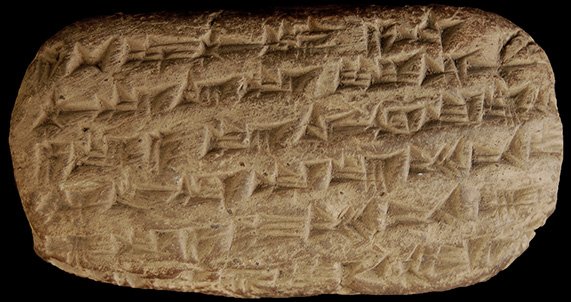Why are you not doing your homework? An Assyrian tale from the library of Assurbanipal.
I found this delightful little correspondence from the ancient world 2700 years ago and wanted to share it. Read on, it may be a tidbit but it’s wonderful!
Somewhere around 680 B.C., in the royal palaces of the ancient Assyrian capital of Nineveh, it seems there was some discontent brewing. The topic? An errant teen (probably), someone not too devoted to the strenuous task of reading and writing. Now, this disobedience has reached the ears of the daughter of the great king, and she has dispatched a little missive.
First, let’s read this letter, etched in the Akkadian cuneiform* into a sun-dried tablet. Possibly written by the princess herself before sending it off to her ‘sister’ (sister-in-law to be precise).
A letter from Assyrian princess Šeru’a-eṭirat to Libbali-šarrat, wife of her younger brother Assurbanipal, prince regent.

“Word of the king’s daughter to Libbali-šarrat:
Why don’t you write your tablet and (do your homework) or (recite your exercise?)
(For) if you don’t, they will say: “Is this the sister of Šeru’a-eṭirat, the eldest daughter of the Succession Palace of Aššur-etel-ilani-mukinni, the great king, mighty king, king of the world, king of Assyria?”
Yet you are a daughter-in-law — the lady of the house of Aššurbanipal, the great crown prince designate of Esarhaddon, king of Assyria.”
— British Museum/Originally Nineveh, Assurbanipal’s library, Nineveh, Iraq
Note: Aššur-etel-ilani-mukinni was the court name of king Esarhaddon (more accurately, Ashur-aha-Iddina, ‘Ashur has given me a brother’). Ashur (Assur) was the god of the Assyrians.
Perhaps there was more and it has not survived. What’s wonderful about this correspondence is many things: first, the fact that a future queen was expected to be literate. The king’s daughter is miffed—why is the daughter-in-law of the great king, one to be queen in the future and wife of Assurbanipal, not paying attention to her homework? Would she not be letting down her sister-in-law and her husband, the prince?
The sender of the letter, Šeru’a-eṭirat, is (likely) the first daughter of the great king (Esarhaddon), and she outranks the daughter-in-law. And yet, even while gently chiding the younger sister-in-law, the princess acknowledges the station of the girl who is wedded to her younger brother, the crown prince (who would outrank the sister, even if she is older). It may be easy to read too much into this that there was a palace intrigue or bad blood between the women—but it is more likely that perhaps the younger girl was not yet fully invested in the royal customs and stifling expectations, and the princess decided to remind the future queen of her obligations, that was all. But one must admit the power of the phrase “word of the king’s daughter” (kind of a do you know who I am?!
It’s tickling to think how exactly this came about. Was a haughty Libbali-šarrat troubling her tutors? Was she in some royal ceremony where she struggled to read or write, causing a loss of face? Well, we will never know—but what we can infer is somehow this got to the princess who made sure to let her sister-in-law know that she is expected to be diligent: you may be a royal but you can’t skip your exercises!
How old was the truant? We don’t know. But we can completely imagine the disdain of a 12-15-year-old at the prospect of having to sit cross-legged and painstakingly etch on a piece of clay!
Well, what happened eventually? Turns out the daughter-in-law/sister-in-law Libbali-šarrat did well. She is depicted in royal reliefs and may have played a significant role during her (very successful) husband’s rule, and it seems she even outlasted him. What was the relationship between the two women? Unfortunately, nothing survives of it, but one can hope that Libbali-šarrat took Šeru’a-eṭirat’s words to heart and not only put in some hard work, but also respected the guidance. Šeru’a-eṭirat herself was well regarded during her life, though she vanishes from official records sometime during Assurbanipal’s reign.
What I love about these little things is when you put aside conquests and wars and blood-thirsty campaigns (Assurbanipal was a ruthless king), everyday life still shows glimpses of what we deal with even now. If the princess of the kingdom can tell a future queen to do her damn homework, we sure can tell our children to sit down and study!
Mesopotamian kingdoms don’t get much love in novels. Very little is set in the periods of Sumerians, Akkadians, and Assyrians. There are entire tablet collections (from the library of Assurbanipal!) that give a glimpse of those fascinating civilizations, including plenty of royal correspondence, complaints, and entreaties.
* The Akkadian cuneiform you see on this clay tablet evolved from the much older Sumerian cuneiform. The Sumerians were an amazing and advanced civilization that ended about 1500 years before the time of this letter! I’ve covered ancient Sumer and incorporated royal correspondence in my standalone mystery/thriller, the Death Pit

Jay Penner's highly-rated books regularly feature Amazon's category bestseller lists. Try his Spartacus, Cleopatra, Whispers of Atlantis or Dark Shadows books. Reach out to him or subscribe to his popular newsletter.
learn more →